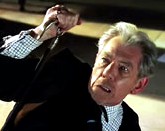 I never had any desire to read The Da Vinci Code but I did think I might go and see the film when it came out. Now that it has, I am not sure I shall bother, since the reviews I have read suggest that in plausibility, literacy and characterisation it is even worse than the book, though seeing Ian McKellen camping it up dementedly is always fun, and nothing so roundly condemned by the Vatican and fundamentalists of assorted faiths can be all bad.
I never had any desire to read The Da Vinci Code but I did think I might go and see the film when it came out. Now that it has, I am not sure I shall bother, since the reviews I have read suggest that in plausibility, literacy and characterisation it is even worse than the book, though seeing Ian McKellen camping it up dementedly is always fun, and nothing so roundly condemned by the Vatican and fundamentalists of assorted faiths can be all bad.Debate has centred on the distinction to be made between truth and fiction in both these works rather than the merits of either. This, as Mark Lawson points out in a Guardian article, is remarkable considering that The DVC is possibly one of the most preposterous novels ever written, and, moreover, that “If Dan Brown had written the book in the style of journalism (a common fictional device), then there might have been confusion among those troubled enough to be confused. But Brown told his tale in a prose so far from reportage (indeed, from any recognisable form of English) that the book telegraphs its own incredibility on every single page”.
Lawson wished to avoid such debate arising over his article, and therefore invented his own simple code to guard as far as possible against misunderstanding: he classified every sentence of it as either O for opinion or F for fact, and notes that “Ian McKellen suggested that perhaps there should be a warning printed at the beginning of the Bible saying that some of it might be fiction; for example, the walking on water. What McKellen said is clearly a fact, F, while the miracles are a matter of O”.
Finally, Lawson says:” In fact (O), let's end with a simple coded message to the book and the film and to those who insist on taking any of its nonsense seriously: FO.”
No comments:
Post a Comment